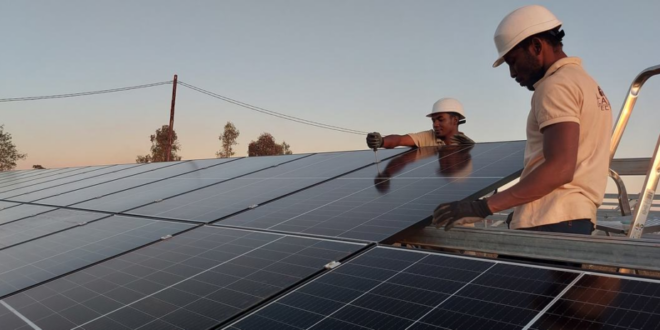Africa GreenTec Madagascar | Installation of a clean energy mini-grid in Mahavelona, Madagascar
New York, USA, January 29, 2024 -/African Media Agency (AMA)/-The United Nations is helping to ensure that developing countries benefit from clean energy. In Madagascar, a promising initiative shows that clean electrification can change lives.
The technology already exists to provide clean energy to rural communities in developing countries that have never had access to electricity. However, as Moritz Brauchle, Managing Director of Africa GreenTec Madagascar explains, these countries will continue to need help to turn their backs on fossil fuels.
Africa GreenTec is a social enterprise that provides sustainable energy solutions to some of the 600 million people in sub-Saharan Africa who currently live without access to electricity.
With support from the UN, the company is installing mini-grids – self-sustaining networks running on renewable energy – to provide clean electricity to residents of a small community or town.
Mr. Brauchle spoke with ONU Info on the occasion of the first International Clean Energy Day, celebrated on January 26.
UN info: What difference can access to clean electricity make in the lives of people in Madagascar?
Moritz Brauchle: I get emotional when I think about it. When we launched our village pilot in 2021, it was pitch black at 6 p.m. The day was over. People went home, cooked and went to bed.
As part of the project, we installed solar street lights, cooling systems and clean electricity. Today, people sell ice cream and juice in the streets and can go to the cinema. Rice mills that ran on diesel no longer pollute the air.
UN info: What proportion of the population lives without electricity?
Moritz Brauchle: About two thirds, unfortunately. The state-owned company is struggling to finance network expansion and connecting more people, and it currently runs on diesel, which is very expensive and polluting.
So we’re going to areas in sub-Saharan Africa where people have absolutely no access to electricity, and we’re building solar power plants with storage batteries and a distribution network, creating access to energy at from scratch.
Using solar energy, combined with storage batteries, we can provide 20 hours of electricity per day. Over the past year and a half, we have experienced two outages lasting three to four hours. It’s better than many traditional networks.
Africa GreenTec Madagascar – A clean energy mini-grid in Mahavelona, Madagascar
UN info: Is it possible to connect mini-grids to cover a larger area?
Moritz Brauchle: This is actually what we are currently working on, in collaboration with the German development aid agency: interconnecting mini-grids to electrify an entire region. This is what we plan to do in the next two years and, in the very long term, to integrate a national network system.
UN info: Your company receives subsidies and aid for its installations in Madagascar. Can this technology be commercially viable in developing countries without this type of support?
Moritz Brauchle: Yes, but two things should change. First of all, we should earn more from carbon emission certificates. This means we would receive more money because we would have helped reduce carbon emissions by replacing diesel generators or avoiding buying new ones.
Secondly, we would need support from the state or, if the state is not able to do so, from an international organization such as Sustainable Energy For All to set up the networks, because it is expensive to start from nothing. Once this is done, we no longer need subsidies to produce electricity.
UN info: Was it difficult to convince the Malagasy authorities to switch to this type of energy production?
Moritz Brauchle: No, they strongly support us and we get cooperation from the Ministry of Energy. However, they need time. Regulations have been established for diesel production, and we must apply for environmental permits and submit studies. We need to get rid of these constraints to allow more people to be connected more quickly.
Yann Raz/ Africa GreenTec Madagascar – Mahavelona, in the Malagasy countryside
UN info: What would you say to people in developing countries who are demanding the right to exploit their fossil fuel reserves?
Moritz Brauchle: We hear these kinds of arguments, and I have to say: who are we to tell them to keep these resources in the ground?
For these countries, it is a source of income. Look at Norway, which is extremely green. It became rich thanks to fossil fuel resources.
If we want the Global South to keep oil and gas in the ground, we need to find a solution, subsidizing renewable energy and providing compensation for the lost revenue stream.
Africa GreenTec’s mini-grid projects in Madagascar are supported by the Universal Energy Facility (UEF), which is managed by SEforALL.
Distributed by African Media Agency (AMA) for UN Info.
The post Will developing countries benefit from the renewable energy boom? appeared first on African Media Agency.
Source : African Media Agency (AMA)
